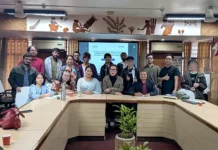KOHIMA, 6 Nov: The apex tribal bodies of Nagaland and the state government reached a consensus on going ahead with a new municipal law and conducting the urban local bodies (ULB) elections which were not held for two decades, Deputy Chief Minister TR Zeliang said on Monday.
The consensus was arrived at in a consultative meeting held between the Assembly Select Committee on Nagaland Municipal Bill-2023, headed by Zeliang, and the tribal organisations during the day.
ULB elections in the northeastern state have been long overdue as the last polls were held in 2004. Since then, elections were not conducted, first on the unresolved Naga peace talks, and then on 33 per cent reservation for women as asked by the Supreme Court, which tribal bodies opposed.
Briefing the media about the meeting, Zeliang said that the meeting was held cordially and there was no adverse opinion from the organisations.
He expressed hope that the bill would be passed by the assembly for making it a law, for which an emergent session has been convened by the governor on 9 November.
During its March session, the assembly repealed the Nagaland Municipal Act, 2001, and decided to bring a new law, incorporating the views of the tribal bodies and civil society organisations on 33 per cent women reservation, and also tax on land and properties.
On major additions and deletions in the bill, Zeliang said that, initially there were objections to granting 33 per cent women reservation in the urban local bodies, but now the tribal bodies have agreed to include it.
However, women’s reservation for the post of ULB chairperson has been removed, he said.
Zeliang said also that, respecting the contention of the people, the proposal to levy tax on land and properties has been deleted from the municipal bill.
He said that only the indigenous inhabitants of Nagaland will be eligible to contest the ULB polls.
“The consultative meeting is successful. Now, after passage of the bill in the assembly, the state will hold municipal elections very soon,” the deputy chief minister said.
Tribal bodies had been opposed to women’s reservation, saying it was against the customary practice of the Nagas. They had also objected to tax on land and properties, saying that it was against the provisions of Article 371 (A) of the Constitution, which guarantees special rights to Nagas on land and property.
The government had announced conducting the elections to the ULBs several times, but staunch objection from the tribal bodies and civil society organisations against the 33 per cent women reservation and tax on land and properties had held back the polls.
In 2017, when the state government led by TR Zeliang tried to hold the elections, there was violence. Two persons were killed and government properties and offices were damaged. It also led to the fall of the Zeliang ministry.
The Neiphiu Rio-led all-party government in March this year also announced the conduct of an election with 33 per cent women reservation as directed by the Supreme Court.
However, following stiff resistance again, the government cancelled the elections and also repealed the Act of 2001.
In the 1 September consultative meeting with the tribal bodies and civil society organisations convened by the state government, it was decided that the ULB elections will be held with women quota, and that the government will table the new Act in the monsoon session of the assembly. (PTI)

